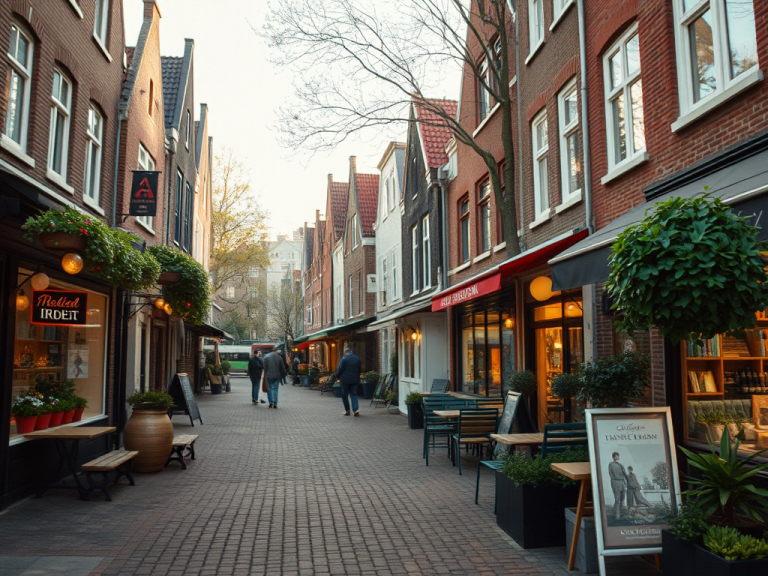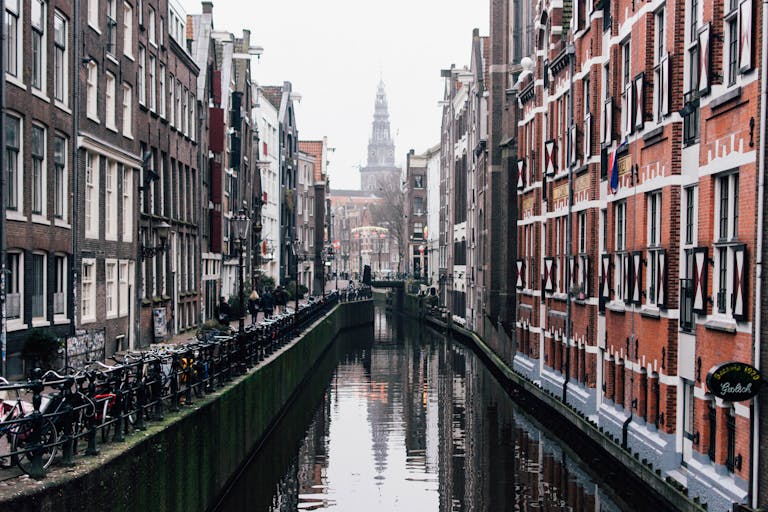The Cost Of Living In The Netherlands: Budgeting For Expats

Understanding the Cost of Living in the Netherlands: Key Expenses for Expats
Moving to a new country comes with many exciting opportunities and challenges. One of the biggest challenges many expats face is understanding the cost of living in their new home. For those relocating to the Netherlands, it’s crucial to consider several key expenses that will impact your budget.
Housing Costs
Your home is likely to be your largest monthly expense. The cost of housing varies significantly depending on the city and the type of accommodation. In Amsterdam, for instance, you can expect to pay more than in smaller cities like Groningen or Zwolle.
- Rent: For a one-bedroom apartment in Amsterdam, rent can range from €1,500 to €2,000 or more. In contrast, the same apartment in Utrecht might cost around €1,200 to €1,600.
- Utilities: Monthly utility bills (electricity, heating, water) usually add an additional €150 to €250, while internet service can cost about €30 to €65.
Transportation Expenses
Transportation is another essential aspect of your budget in the Netherlands. Many expats choose to rely on public transport, which is efficient and well-connected.
- Public Transport: A monthly public transport pass can cost between €70 to €100, depending on which cities you’ll be traveling to.
- Bicycles: Given the Netherlands’ bike-friendly culture, buying a second-hand bicycle might cost around €100 to €300, making it a popular option for many.
Groceries and Dining
When it comes to food, the cost of groceries can vary, but understanding the average expenses can help you create a practical budget.
- Groceries: A monthly grocery budget for one person typically ranges between €250 and €350.
- Dining Out: Eating out can be quite expensive. A meal at a mid-range restaurant may cost around €15 to €25 per person. If you prefer fast-food chains, expect to pay around €8 to €12.
Healthcare Costs
The healthcare system in the Netherlands is top-notch, but it requires that expats obtain health insurance. You’ll need to budget for this important expense.
- Health Insurance: Basic health insurance premiums generally range from €100 to €150 per month. Additionally, you might have some out-of-pocket costs depending on your coverage.
Childcare and Education
If you’re moving with children, childcare and education costs are important to consider. The Netherlands offers various schooling options, but they can vary in price.
- Childcare: Daycare for young children can be quite costly. Expect to pay between €600 and €1,200 per month depending on the facility and hours.
- International Schools: If you’re looking for international education, tuition fees can range from €12,000 to €20,000 per year.
Entertainment and Leisure
Living in the Netherlands offers plenty of entertainment and leisure options, but they do come with their own costs. Understanding these can help you plan your budget effectively.
- Cinema Tickets: A cinema ticket will cost you about €10 to €15.
- Gym Memberships: A monthly gym membership is typically around €30 to €50.
As you settle into life in the Netherlands, it’s essential to create a comprehensive budget that reflects your lifestyle and spending habits. By being aware of the key expenses—housing, transportation, groceries, healthcare, childcare, and leisure—you can better navigate your new environment.
While the cost of living in the Netherlands may initially seem high, many expats find that the quality of life, social services, and work-life balance are well worth the investment. By planning your budget carefully, you can enjoy all that this vibrant country has to offer.
Housing Options and Their Impact on Your Budget
When moving to the Netherlands as an expat, one of the most significant factors affecting your budget is housing. The type of accommodation you choose can drastically change your living expenses. Understanding your housing options will help you plan financially and make informed choices. Here we explore various housing types and their impact on your budget.
In the Netherlands, different types of housing come with varying costs, sizes, and amenities. Here, we’ll break down the most common options available to you:
- Rental Apartments: Renting an apartment is a popular choice for expats. Depending on the city, prices can vary widely. For instance, in Amsterdam, expect to pay between €1,200 to €2,500 per month for a one-bedroom apartment in the city center. In smaller cities, those prices can drop significantly, making them more affordable.
- Shared Housing: If you’re on a tight budget, consider sharing a flat with other expats or locals. In this setup, you pay for a room while sharing common areas like kitchens and living rooms. This option can reduce your rent by 30% or more, so it’s a great way to save money while meeting new people.
- Student Accommodation: If you’re an expat student, many cities offer student housing. These can be cheaper than traditional rentals and may include utilities. Typically, you might pay €400 to €800 per month depending on the location and type of student housing.
- Houses: Renting a whole house is ideal for families or those looking for more space. However, this option can be significantly more expensive, ranging from €1,800 to over €3,500 monthly, especially in urban areas. Ensure your budget can accommodate this before committing.
- Short-term Rentals: If you’re only planning to stay in the Netherlands for a few months, short-term rentals like Airbnb can be a flexible option. Although generally more expensive per month than long-term rentals, this might suit your needs if you want to explore before committing.
Understanding the impact of location on housing prices is essential. Living in major cities like Amsterdam, The Hague, or Rotterdam will typically cost more than residing in smaller towns or rural areas. For example, while you may find a cozy apartment for €1,600 in Amsterdam, a similar place might only cost you €800 in a town like Groningen.
Another critical factor in your housing budget is utilities. In the Netherlands, utilities (heating, electricity, water, and internet) can add another €150 to €300 to your monthly expenses. Some rental contracts include utilities in the overall price, while others do not, so clarify this with your landlord to avoid surprises.
Additionally, consider the cost of furnishings when moving into a rented space. Some apartments come furnished, which might save you some money upfront. Others may be empty, requiring you to purchase or rent furniture. Budgeting for furnishings can range from €100 to €1,000 depending on your needs and preferences.
Transportation costs also relate to your choice of housing. If your home is located farther from work or public transport, you may face additional costs for commuting. Investigate local transport options and how they fit into your daily life and budget before making your decision. An average monthly public transport pass can cost around €85 in cities such as Amsterdam.
Don’t forget about the administrative aspects. Renting a property in the Netherlands often requires a deposit, typically one or two months’ rent, which can be a significant upfront expense. Always factor this into your housing budget to ensure you’re financially prepared.
Your housing choice in the Netherlands impacts not only your monthly rent but also other expenses such as utilities, furniture, and commuting costs. Taking the time to carefully assess your options and plan accordingly can help you find the right accommodation without straining your finances. By balancing amenities, location, and budget, you can enjoy your new life in the Netherlands while staying financially secure.
Navigating Grocery and Dining Costs in Dutch Cities
Moving to a new country, such as the Netherlands, can be both exciting and daunting. One of the major aspects you will need to navigate is the cost of groceries and dining out in Dutch cities. Understanding this will help you budget more effectively and enjoy your culinary experience without breaking the bank.
In the Netherlands, grocery prices can vary significantly depending on your location. Generally, larger cities like Amsterdam, Rotterdam, and The Hague tend to have higher prices compared to smaller towns. Here’s a breakdown of some common grocery prices you’d expect to see:
- Bread (500g): €1.50 to €2.50
- Milk (1L): €0.80 to €1.20
- Eggs (12): €2.00 to €3.00
- Cheese (1kg): €7.00 to €12.00
- Chicken breast (1kg): €7.00 to €10.00
- Rice (1kg): €1.50 to €2.50
- Fresh vegetables (varies greatly): €1.50 to €3.00 per kg
- Fruits (varies greatly): €1.00 to €3.00 per kg
When planning your grocery shopping, it’s important to consider the type of stores you visit. Supermarkets like Albert Heijn and Jumbo tend to have a wide variety and consistent prices. Discount stores like Lidl and Aldi offer lower prices on everyday items, which can save you a lot, especially if you’re feeding a family.
Another crucial factor is where you decide to shop. Local markets can be a delightful experience and often yield fresh produce at reasonable prices. However, they may not always be the most affordable option. Always compare prices and check for promotions or weekly deals at stores. Most supermarkets in the Netherlands run sales on certain items, making it possible to snag quality products without overspending.
Choosing what to cook can also impact your budget. Traditional Dutch meals tend to be quite affordable. Staples include potatoes, vegetables, and meat. Learning to prepare simple, hearty dishes can help you control costs while allowing you to enjoy authentic Dutch cuisine. Consider meal prepping to save both time and money, as cooking in bulk often reduces the overall cost per meal.
Dining out in Dutch cities can be a delightful experience, but it’s essential to know what to expect. The cost of eating out varies widely based on the type of restaurant. Here’s a rough guide to what you might pay:
- Inexpensive restaurant: €10 to €20 per meal
- Mid-range restaurant (three-course meal for two): €50 to €80
- Fast food: €7 to €12 per meal
- Café latte: €2.50 to €4.00
- Bottle of water (0.33L): €2.00 to €3.00
If you are keen on dining out but want to stick to your budget, consider these tips:
- Go for lunch specials: Many restaurants offer cheaper lunch options, often including a drink.
- Try local eateries: Small, family-run establishments typically provide good food at lower prices than larger chains.
- Consider takeout: Sometimes, dining at home while enjoying a restaurant’s menu can save you a significant amount.
- Join locals: Check online community groups for recommendations where expats and locals share their favorite haunts that won’t empty your wallet.
Another appealing option is to explore the food trucks or street vendors. They often provide hearty meals at a fraction of the cost, allowing you to experience Dutch culinary culture without excessive spending. Think about trying out local specialties like stroopwafels or poffertjes as you walk around.
Budgeting for groceries and dining in the Netherlands can initially seem overwhelming, but with some planning and local knowledge, it can turn into an enjoyable adventure. By leveraging local options, being mindful of your shopping habits, and exploring various dining experiences, you can manage your costs effectively while indulging in the delicious cuisine the Netherlands has to offer.
Transportation Expenses: Biking, Trains, and Public Transit
When moving to a new country, it’s critical to budget wisely, especially when it comes to transportation expenses. In the Netherlands, getting around is not only efficient but also diverse. The three main modes of transport that you should consider are biking, trains, and public transit. Each has its unique benefits and costs that you need to be aware of.
Biking: The Heart of Dutch Transportation
Biking is perhaps the most famous aspect of transportation in the Netherlands. With expansive bike paths and friendly cycling infrastructures, you’ll find that biking is a convenient and cost-effective way to move around. Here’s what you should know:
- Purchase and Maintenance: A decent second-hand bike can cost you around €100 to €300. If you opt for a new bike, prices can range from €400 to €1,000, depending on the brand and features.
- Insurance: It’s a good idea to insure your bike, which may cost between €50 to €100 a year. This protects you against theft or damages.
- Repairs: Basic bike maintenance, such as tire changes or brake replacements, may cost around €10 to €100 annually if done occasionally.
- Parking: Most cities have ample bike parking facilities for free or at a nominal fee. However, always ensure that you park in designated areas.
By biking, you not only save money, but you also contribute positively to your health and the environment, creating a win-win situation. However, be cautious of the weather, especially during rain or snow, as this can affect your cycling experience.
Trains: Fast and Far
Trains are an excellent option for traveling longer distances between cities or regions. The Netherlands boasts an efficient and well-connected railway system. Here are some key points:
- Train Passes: If you plan to travel frequently, consider purchasing a NS OV-chipkaart, which can provide discounted fares. A monthly subscription ranges from €60 to €150 depending on your travel frequency and distance.
- Single Tickets: For occasional travelers, a single ticket to travel within the Netherlands typically costs between €10 and €30.
- International Travel: If you need to cross borders, international trains like Thalys or Eurostar link you to neighboring countries, with fares starting at around €29 with advance booking.
Trains in the Netherlands are punctual, making them a reliable choice for anyone needing to manage their time effectively. It’s also easy to access train stations throughout the country, which adds to the convenience.
Public Transit: Buses and Trams
Public transportation is integral in urban areas. Major cities like Amsterdam and Rotterdam have comprehensive bus and tram networks, which allow you to explore the cities thoroughly. Investing in public transport is budget-friendly:
- OV-chipkaart: This card is crucial for using buses, trams, and trains across the Netherlands. You can load it with credit or get a monthly pass starting at around €70.
- Single Journeys: A single journey using public transit costs between €2.50 and €4, depending on the distance.
- Discounts for Students: Students may benefit from additional discounts, meaning the costs can reduce significantly if you qualify.
Using public transit can also save you the trouble of finding parking and reduces the stress of navigating busy urban streets. This mode of transport is especially valuable if you’re living in a metropolitan area where driving may be impractical.
Final Thoughts
Budgeting for transportation expenses in the Netherlands involves understanding your primary travel needs. Whether you choose biking for daily commuting, trains for intercity travel, or public transit for getting around urban areas, each option comes with various cost factors. By making informed decisions, you can enjoy a flexible and affordable transport experience in your new home.
Embrace your new lifestyle in the Netherlands, and enjoy the freedom and mobility that these transportation options offer. With these insights and considerations, you’ll be well-equipped to handle the costs of living and get the most out of your time as an expat.
Tips for Saving Money and Budgeting Effectively as an Expat
If you are an expat, adjusting to a new country comes with a whirlwind of experiences and challenges. One of the most crucial aspects is managing your finances. Here are some tips to help you save money and budget effectively while living abroad.
Know Your Cost of Living
Understanding the cost of living in your new city is essential. Start by researching average prices for:
- Housing (rent or purchase)
- Utilities (electricity, water, internet)
- Groceries
- Transportation (public transport and fuel costs)
- Healthcare
- Miscellaneous expenses (entertainment, dining out)
Many online platforms provide cost of living calculators to help you compare your living expenses with those in other regions.
Create a Realistic Budget
Once you have a clear understanding of your costs, it’s time to create a budget. Consider using budgeting apps that can simplify this process. When making your budget, ensure it includes:
- Basic living expenses
- Emergency savings fund
- Fun money for activities and entertainment
- Travel and vacation savings
Capture every detail to ensure you know exactly where your money is going.
Track Your Spending
Tracking your expenses is vital to sticking to your budget. Observe your spending habits to identify areas where you can cut back. Simple strategies include:
- Keep receipts or use apps for tracking
- Review your bank statements regularly
- Set up alerts for spending limits
Being aware of your financial habits can help you make better choices with your money.
Utilize Discounts and Promotions
Look out for discounts, promotions, or local deals available to expats. Many local businesses offer special rates or are part of expat networks that provide deals. Whether it’s for dining, shopping, or entertainment, every little bit adds up:
- Join local Facebook groups
- Sign up for newsletters from local businesses
- Use coupon websites
Make it a habit to ask if there are any discounts available when you shop or dine out.
Consider Local Transportation Options
Transportation can greatly impact your budget. If you’re in a city with efficient public transport, utilize it instead of relying on taxis or ride-shares. Investigate:
- Monthly or yearly transport passes
- Bicycle rentals or purchases (common in many Dutch cities)
- Carpooling options with colleagues
Choosing the most economical and environmentally-friendly options can save you a lot in the long run.
Open a Local Bank Account
A local bank account makes money management easier. Avoid international transaction fees by handling your finances in the local currency. Research banks that offer accounts with:
- No monthly fees
- Access to online banking
- Good ATM networks for cash withdrawals
Having a local account simplifies everything from bill payments to salary deposits.
Meal Planning and Cooking at Home
Eating out often can drain your budget quickly. Instead, opt for meal planning and cooking at home. To effectively do this:
- Create a weekly meal plan with cost-effective recipes
- Buy groceries in bulk to save money
- Take advantage of seasonal produce to lower costs
Not only will you save money, but this approach helps you eat healthier as well.
Get to Know Local Markets
Local markets are a treasure trove for fresh produce and unique products. They are often cheaper than supermarkets. Visiting local markets not only supports small businesses but allows you to:
- Find seasonal fruits and vegetables
- Discover local delicacies
- Enjoy a lively shopping experience
These tips can lead to significant savings and foster a deeper connection with your new community.
Adapting to life as an expat involves numerous adjustments, but effective budgeting can ease your financial worries. By applying these strategies, you can enjoy your new home while keeping your finances in check.
Conclusion
When adjusting to life in the Netherlands as an expat, understanding the cost of living is crucial to creating a workable budget. Key expenses, such as housing, can significantly impact your finances, especially in cities like Amsterdam or Utrecht, where rental prices tend to be higher. Exploring various housing options—like shared accommodations or rural living—can help you find a balance that suits your budget.
Grocery and dining costs also play a major role in your overall expenses. Embracing local markets and cooking meals at home can offer significant savings, while enjoying a meal out can add to your monthly budget if not planned properly. Learning to navigate the nuances of food prices can help you stretch your euro further.
Transportation in the Netherlands is notably efficient, with biking, trains, and public transit as popular choices. However, don’t overlook the costs associated with these options. Investing in a good bicycle offers freedom and savings, while using public transit effectively can lead to better financial management.
Budgeting effectively is key to enjoying your expat experience without constantly stressing about money. Simple strategies, such as tracking your expenses and prioritizing needs over wants, can create more room in your budget for leisure and exploration.
Ultimately, by familiarizing yourself with the cost of living factors and implementing smart financial strategies, you can successfully navigate your new life in the Netherlands. You’ll not only thrive but fully enjoy the incredible experiences this vibrant country has to offer.




